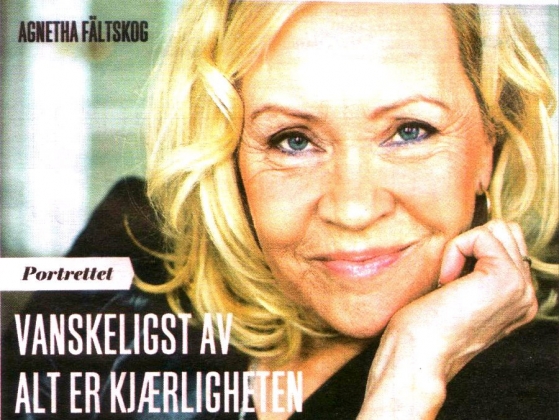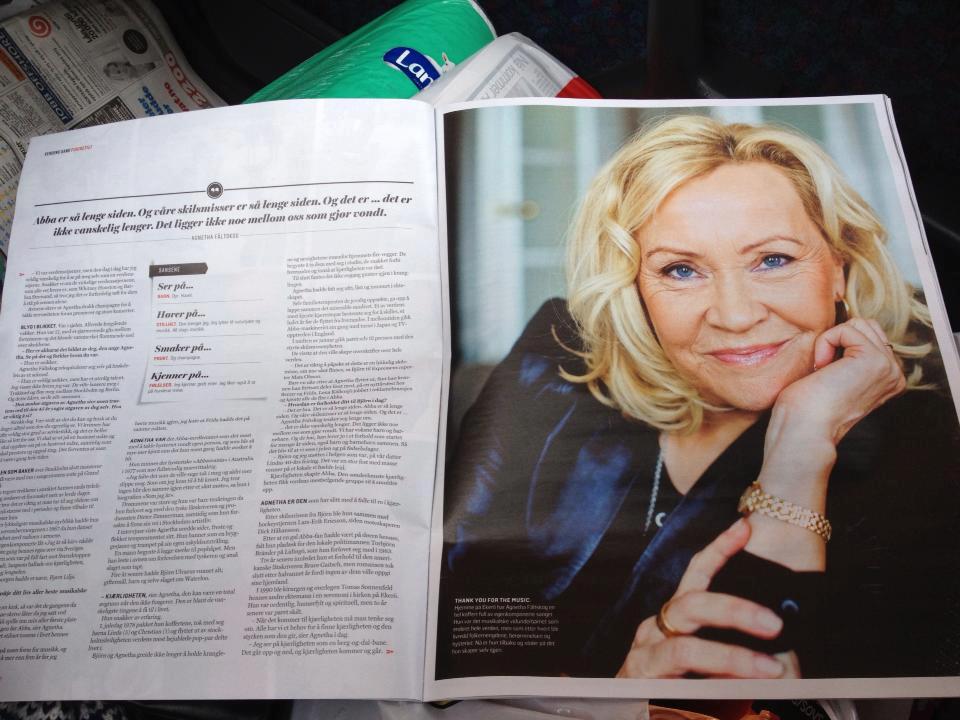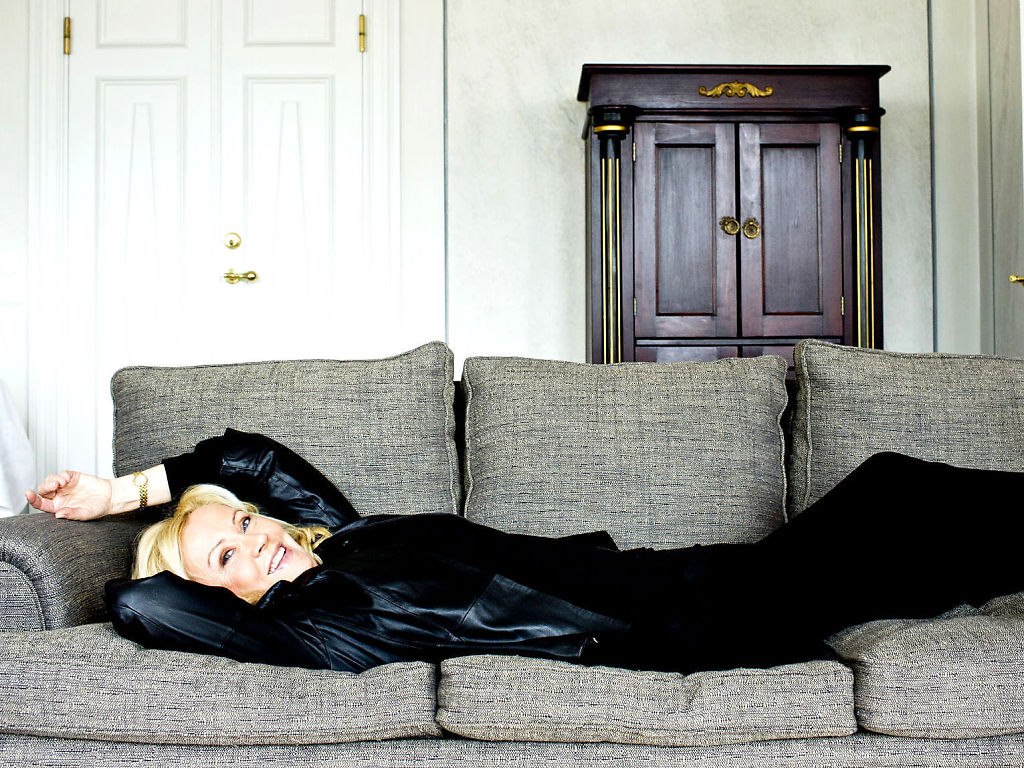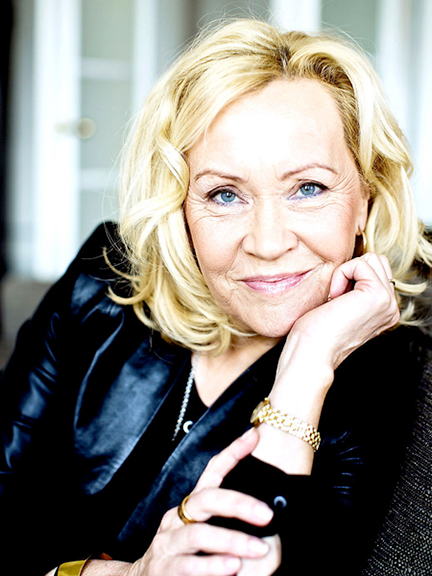
A quick translation of the VG Helg article. More to follow………… Phobias and loud public noise has always bothered Agnetha Fältskog (63). But love is her most troublesome life project. Pop’s “Greta Garbo” has crept out of the winter and taken the first steps into the world, most thought she had left behind. The reunion with the public involves doing almost everything that bothers her, and the Abba years gave her an overdose of that. Stage fright. The fear of flying. The fear of moving out in public and to be devoured alive by the fans and the media-shy person. Phobias and the loud public not with standing, Agnetha Fältskog see’s herself as strong and earthy. Things she needs to lean on now that she release the first album of new material in 25 years. She is the long legged, blonde sex bomb who owned the 70s. The heartbreaking vulnerability in her voice, raised it to one of pop’s greatest band. She created the soundtrack for millions of people’s lives but their own world stardom, she has an almost indifferent relationship. The fame was miserable. Now the voice of Jönköping is back. There is a long and unbroken line of people that shyness has been in Agnetha Fältskog life. - I hid always when people bent over the stroller to peek at me. My mum thought it was so funny. A hermit was born. No other’s eyes and ears one her, and my will to be with her , we meet Agnetha for one of the rare interviews at a Stockholm hotel where the legendary film diva Greta Garbo used to live incognito. - You’ve described yourself as a lone wolf? - Yes. - A bit like Ferdinand the Bull, who would rather sit under a tree and smell the flowers instead of showing off the bullring? - Yes, absolutely. 
- Is loneliness a good friend? - Yes. I’m not afraid of being lonely, I derive a great power in it. Many people are very afraid of being alone, but I do not feel it. I think it is because I have a high degree of harmony and basic security in myself. - It has been obvious that you are a person with low self-esteem, you are shy and not very social and at times you struggle with anxiety and restlessness. How is your life really in hop? - It’s a bit strange, because it all depends on the situation. Some things in this industry, I am completely unmoved by. Give me a film camera, and I know of no concern, says Agnetha. - But there can be little things I see as harsh and problematic in everyday life. Much of it is that I usually always recognized. - How do you work to create the best possible balance in your life? - I have a very big need for sleep that I meet. I go for long walks in the woods and try to live healthy, healthy in general. If I can I just sleep at nights and be healthy, then that’s good. Winter has been cold and bitter also on the Swedish island secluded on Ekerö It has made the bell clear voice, often ill.But Agnetha has forced herself to perform anyway. One and a half years it has taken her to work on the love album “A”. - Since I am sensitive human , I give all the songs. It is very much emotion in this album. One of the world’s greatest pop stars started on a Christmas party in the fishing club in Jönköping in 1955. The five year old on stage was a rare musical talent was completely overshadowed by the elastic of her pants broke so that it slid under her dress just as she stood and sang “Billy Boy.” People writhing in laughter. Agnetha does not remember, but it may have been the start of stage fright. The fear of being seen. - Now I’m not so often on stage anymore. But when I was on Skavlan recently, I was terribly nervous. I can’t handle it to have pressure on me, and I shall be a kind of problem solver and say wise things about politics and religion, it’s not my department, although I follow well with what is happening around me. Agneta Åse Fältskog – baptised Agneta without h – was the daughter of the local king cabaret and musical his wife. Piano tones as a day sounded from the apartment above, came as a revelation into her life. In light blue dress trooped the five year old girl up with piano teacher Segvard Andersson and remained there. She composed her first song at age six, was given her own piano that year. Before teens she played Bach solo in church, at age 13 she formed girl band and two years later she was the front singer in the established dance band Bernt Enghardts orchestra. She dropped out of school, got a job as a switchboard lady and toured with the band late into the night. Then she fainted at work of too little sleep, too little food and too many cigarettes did not give an appetite for life she was leading. - There was no orchestra got a record deal with legendary Little Gerhard in 1967, but you. When the day of recording in Stockholm came, you were so nervous that you had to resort to pills? - I do not know if I took the pills so much, but I get very easily stressed in these situations. Anyway, I reached the top in life. But there are certain things that I have found very difficult. - Stage fright? - At the beginning with Abba it was very, very troublesome. It’s not my thing to be on a stage. But we four Abba pepped each other up. I think solo artists have it much worse, say’s Agnetha. - We were royalty, but to this day I have very hard to see myself as a world star. Are we talking about the real world stars, as everyone knows who is, as Whitney Houston and Barbra Streisand, so I think it’s awful tough for them to stand on stage alone. The newspapers wrote that Agnetha drank champagne to tackle nervousness ahead of premieres and major concerts. Shyness in her eyes. Was the soul. Already captivating beautiful. She was 17, with a charming grin between the ? and the blonde trademark flowing down over her shoulders. - It’s just that picture of you, the young Agnetha. Look at it and tell me who you were. - She is not sure. Agnetha Fältskog recapitulates itself in a fraction of a second. - She is very uncertain, but has an incredible talent. I did not know who I was. They would launch me in Germany and flew me between Stockholm and Berlin. And this hair, they said all along … - The mature version of Agnetha say some words of comfort to the 45-year younger version of yourself. What is important to say? 
- Stretch. Be proud of what you can and remember that you are good as always who you really are. We women often have very high degree of self-criticism, and it is not so easy for us. We should look a certain way and we should behave in a certain way, and we shall achieve and accomplish things. It is expected that you should be running all the time. The sun breakes through the window at the singer’s suite at the Grand Hotel. The light features of her face more clearly, revealing a dense network of living days. - I think it is important that you take the advice that you need to unwind at times and get back to herself, she says. His happiest musical moments she had probably the November morning in 1967 when she danced around on the floor with the radio in his arms. Her self-composed song “Jag vär sa kar” reached for the first time her own ears by Swedish Radio. The song was at full speed towards the Swedish top chart, it was a tearful, slow ballad about love, loneliness and longing. Love and Grief had a name; Bjorn Lilja. Her first boyfriend. - It was perhaps a lifetime best a musical best time? - Talking of the child, it was the times when I was little and could write songs when I sat at the piano, and when I got to record my first album and found success before Abba, say’s Agnetha. After the Abba hysteria died down the notes in her life stopped completely. - I did not hear any kind of music, and least of Abba. It took more than five years before I heard the music again, I read that Frida felt the same way. Agnetha was the Abba member who struggled most to cope with the hysteria around herself, and that was so much more famous than she had ever wanted to be. She recalls the hysterical “Abba Mania” in Australia in 1977 as something nightmarish. “I felt like they would get hold of me and never let me go. As if I was going to be crushed. I think no one will be the same again after a meeting like that, “she said in the biography” As jag är “. The dreams were big and she was only a teenager when she became engaged to the German songwriter and producer Dieter Zimmerman, while she tries to find her way in Stockholm artist career. In interviews Agnetha intrepid pages, sputtered and splashed his temper. She swore like a longshoreman and stomped on her own innocence radiance. Men began to notice the pop star. But read in the newspaper about the engagement with the German and regarded the battle as lost. Four years later, Björn Ulvaeus won everything, marriage, children, and the Battle of Waterloo. - LOVE, say’s Agnetha, it can be a total abyss when it does not work. It is one of the hardest things to achieve in life. She speaks from experience. 1 Christmas Day 1978 she packed suitcases, took the children Linda (5) and Christian (1) and moved out of the apartment in stockholm that the world’s most acclaimed pop-couple shared their lives in. Björn and Agnetha could not longer keep quarrels and disagreements within the four walls. They started taking them with him in the studio, they were talking past each other and realized that love was dead. Finally, there was not even sparks again in arguments. Agnetha had felt unfree, locked and mortared in marriage. Although the family therapist regularly consulted, gave up to patch together the miserable married life. One of the world’s most famous lovers decided to divorce, half a year before they moved apart. Meanwhile went Abba its machinery started touring in Japan and a TV appearance in England. In mid-January, the couple themselves told the press in a controlled interiew about the divorce news. They knew that it would create headlines around the world. - It is important to point out that this is a happy divorce, if something exists, Björn said to Expressen’s reporter Mats Olsson. Just a week after that Agnetha moved out, he found the woman he still sharing his life with, at a New Year party at Benny and Frida. Lena Källersjö worked in the advertising industry and known all four of Abba. - How is your relationship with Björn today? - It’s good. It’s so long ago. Abba’s so long ago. And our divorce rate is so long ago. And it’s … Agnetha Fältskog think about this for a while. … it is not difficult anymore. There is nothing between us that hurts. We have adult children and grandchildren. And they have, he does live in a relationship that started many years ago, including children and grandchildren together. So it is that we’ll see you at Christmas and birthdays. - Björn and I met at the weekend that was, our daughter Linda’s 40th birthday. There was a big party with lots of friends at a local place we had rented. Love created Abba. The broken love got the world’s best-selling group to crumble. 
Agnetha is the one who has struggled to come to rest in love. After her divorce from Björn, she dated hockey star Lars-Erik Ericsson, then fashion creator Dick Håkansson. After a crazy Abba fan had been on her door, she fell head over heels for the local policeman Torbjörn Brander on Lidingö, whom she became engaged in 1983. Three years later she began a relationship with the American songwriter Bruce Gaitsch, but the romance ended after eighteen months because none of them would abandon their homeland. In 1990, the surgeon Tomas Sonnenfeld and her second husband married in a ceremony at the church on Ekerö. He was extraordinary, humorous and spiritual, but two years later the couple divorced. - When it comes to love, one must think. We all have a need to find love and the strength it provides, say’s Agnetha today. - I see love as a roller coaster. It goes up and down, and love comes and goes. In 1997 Agnetha’s reportedr elationship to a whole world looked in retrospect and was watched as inconceivable and just unimaginably sad. THE MADMAN, the Dutch industrial worker who had been in love with her 17 years old idol since he was eight. So obsessed was he that he bought a house pnear AgnethaFältskogs neighboring property. On one of his many trips to Sweden, he drives off the road. He was on his way to Agnetha after a death in her circle of friends, and writes about the incident in a letter to the pop star. One of their more than 300 letters. Three days later she bangs on n Gerts cabin doors. Shortly after the idol and admire become romantically. Gert has never been with a girl before. Some days Agnetha Fältskog age of 50, it was announced that she had prosecuted a man who had stalked her. The man was THE MADMAN. He was several times arrested for harassment and persecution and was eventually denied entry to Sweden. Agnetha never commenting on the case. She addss no wood for the fire. - Is love the same now as it was before? - It is difficult because one can not determine that something will last forever. But you have to live in what is, and try to be content with what one has. Whether you live in a relationship or not, one must make the best of it. - Do you have a boyfriend now? - I can not say anything about that, ha-ha! - Nothing? - NO, I can not do, she adds with a far stricter tone. - Are you an impulsive woman who fall in love easily? - I tend to like people, yes. I try not to have preconceived notions about people. I think everyone should get a chance. - What do you expect from a relationship today? - Mmmm … - There must be faithful, trustworthy and honest. She thinks about it and whispers loudly to herself, ‘What shall I say? - Should a relationship be good, so both must work with it, no matter how we live together and how much they trust each other. But what often happens and turns out, that one can not trust each other, she says. - It feels sad that it is like that, because there are so many ? for us people in your life. Agnetha is a love refugee. Always the one who leaves her men. Behind high walls, with the sea as its closest neighbor, lives Agnetha Fältskog, her secluded life an hour’s drive south-west of Stockholm. - I think it’s nice to have people around me sometimes, but pretty soon, I know how wonderful it is to retire. The two children, three grandchildren and her two dogs, is what gives her the greatest pleasure in life. - They are my treasures. 
- Do you know of a confidence of being older? - Mmm. In one way it gets better. But I can not say it’s cool to be older. You might learn to handle everyday situations better, and you can be in support of their children and grandchildren on what you have learned about life, say’s Agnetha. - But more often it is that I ask my daughter for advice now. |